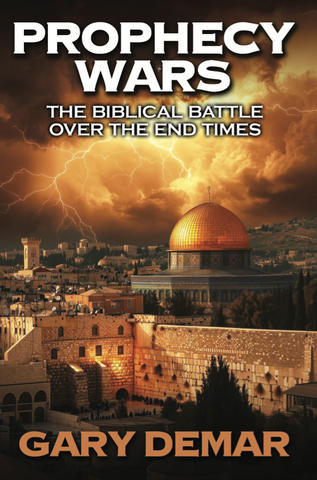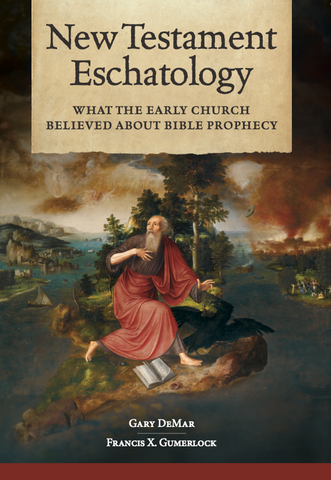Is Lip Service Being Paid to Sola Scriptura?
In my opinion, in the battle over eschatology, creeds and confessions are heavily weighted toward dogmatism because eschatology has been a landmine of interpretive confusion. Let’s nail down some non-negotiable “I believes” and let combatants fight about the non-essentials in the never-ending Prophecy Wars.
It’s become even more so with the advent of dispensational premillennialism. For many dispensationalists, there is no debate. The Bible teaches dispensationalism, and that’s the end of the story. John MacArthur said this at a G3 Conference, “I think people get confused because there have been historically so many voices.” He goes on to say that the only way to interpret the book of Revelation is through the matrix of a dispensational hermeneutic. He added, “If your hermeneutics are the same in Revelation, you’re going to end up with the church age, the tribulation, the return of Christ, the establishment of the Kingdom and the new heaven and the new earth, and it’s just that simple. You almost have to go to school to get that unraveled.” Yes, like Dallas Theological Seminary and the Master’s Seminary. Before that there were the notes in the Scofield Reference Bible.

If you’re willing to take the Bible at its word, the study of prophecy can strengthen your faith, but if your trust is in man’s speculations, you will be disappointed every time. And that is why Bible prophecy is such a crucial area for apologetics. Skeptics of all stripes have condemned the Bible as inaccurate merely because various well-meaning Christians have been in error about the End Times.
Non-dispensationalists will recoil in horror at MacArthur’s claim. Why? Because the Bible refutes a dispensational hermeneutic by MacArthur’s standard of a consistent literal hermeneutic! (I’ll be addressing MacArthur’s comments at the Berean Bible Church Spring 2025 Bible Conference—April 25-27—in Chesapeake, Virginia.)
Creeds and confessions aren’t appealed to because they don’t address hermeneutics. The Nicene Creed does not say anything about Sola Scriptura, although the Nicene Creed does use the phrase “according to the Scriptures.” But differences among believers acknowledge an appeal to the Bible, but how faithful are we to that acknowledgment when it comes to eschatology.
The Nicene Creed mentions “resurrection of the dead” and “and He shall come again, with glory, to judge both the living and the dead,” but it takes a study of Scripture to determine what those phrases mean. Paul said, “I am on trial for the hope and resurrection of the dead!” (Acts 23:6; also 24:21). Jesus said, “For the Son of Man is about to come in the glory of His Father with His angels and WILL THEN REPAY EVERY PERSON ACCORDING TO HIS DEEDS.’” (Matt. 16:27). What Scripture passages did the bishops at the Council of Nicaea use when they formulated the phrase “from thence he shall come again, with glory, to judge the quick and the dead; whose kingdom shall have no end”? Did they appeal to Matthew 16:27-28; 24:27, 30, 37, 48, 50; 25:19, 31-32; Acts 1:11; 17:31; 1 Thessalonians 4:13-5:11; 2 Thessalonians 2:1-2; Revelation 1:7; 2:5, 16; 3:3, 10; 19:11-16; 22:7, 10, 12, 20? Do we know? See chapter 11 in my book with Francis X. Gumerlock New Testament Eschatology for more information.

Since the futurist perspective has been promoted as an early church reality by so many for so long, few question it. New Testament Eschatology challenges this prevailing futurist view with a careful study of the historical record. The evidence shows that many early church writers understood the destruction of Jerusalem in AD 70 to be the end of the Old Covenant world.
Before people start throwing the word “heretic” around and declaring anathemas, let’s get back to the ultimate standard, that is, “according to the Scriptures,” a point made repeatedly by many over the years but not always followed. After reading, the following incomplete list will most likely be met with, “But…”
• “[W]e should not seek to impose on church officers a form of creedal subscription intended to be maximally precise. We are often tempted to think that heresy in the church could be avoided if only the form of subscription were sufficiently precise. Thus in some circles there is the desire to require officers (sometimes even members) to subscribe to every proposition in the church’s confession. After all, it might be asked, why have a confession if it is not to be binding? But that kind of ‘strict’ subscription has its problems, too. If dissent against any proposition in the confession destroys the dissenter’s good standing in the church, then the confession becomes irreformable, unamendable, and, for all practical purposes, canonical. And when a confession becomes canonical, the authority of the Bible is threatened, not protected.”
*****
“The fact is that Scripture, not some form of ‘precise’ theology, is our standard. And Scripture, for God’s good reasons, is often vague. Therefore there is no way of escaping vagueness in theology, creed, or subscription without setting Scripture aside as our ultimate criterion. Theology does not dare to try to improve the preciseness of Scripture. Its only role is to apply what Scripture teaches. Let us be satisfied with that modest task, for it is glorious.”[1]
• “There have developed tremendous conflicts in the Body of Christ about the subject of the Second Coming of our Lord. And I think that what we ought to do is to have freedom to express ourselves without being penalized for our positions. And unfortunately, that’s what’s going on today….”[2]
• “I am a Bible guy. What does the Bible say? What does the Bible teach? And whatever it is that the Bible tells us, we need to be good with it. No nervous throat clearing. No digging a hole in the carpet with your toe. Once the exegesis is done, no problem passages. And this posture means that sometimes you will collide with the Pharisees. Other times you will get challenged by the Sadducees. And then a handful of other times the Herodians will get into the act.”[3]
• “The authority of the Holy Scripture, for which it ought to be believed, and obeyed, dependeth not upon the testimony of any man, or church; but wholly upon God (who is truth itself) the author thereof: and therefore it is to be received, because it is the Word of God.” (WCF, 1:4)
• “The infallible rule of interpretation of Scripture is the Scripture itself: and therefore, when there is a question about the true and full sense of any Scripture (which is not manifold, but one), it must be searched and known by other places that speak more clearly.” (WCF, 1:9)
• “The supreme judge by which all controversies of religion are to be determined, and all decrees of councils, opinions of ancient writers, doctrines of men, and private spirits, are to be examined, and in whose sentence we are to rest, can be no other but the Holy Spirit speaking in the Scripture.” (WCF, 1:10)
• “All synods or councils, since the Apostles’ times, whether general or particular, may err; and many have erred. Therefore they are not to be made the rule of faith, or practice; but to be used as a help in both.” (WCF, 31:3).
• “Confessions are human artifacts. No confession can be elevated to equality with the Bible in an orthodox Church. To do so would divinize the creed or confession. Creeds are imperfect. Creeds must be supplemented by confessions as times and concerns change. A creed that is never changed and never supplemented is abandoned to the realm of the past; it becomes a museum piece or an icon that is invoked for tradition’s sake. The progress of confessions in history is a mark of theological progress. So, the question arises: How to preserve the authority of a confession, if wholesale changes threaten it or no changes whatsoever also threaten it? Here is the dilemma: if the confessions are never revised because of men’s fear of reducing the confessions’ authority, the confessions will eventually lose authority, for they will become out of date.
“Only the Bible possesses timeless authority, according to the Westminster Confession. So, if Presbyterian courts neglect to enforce the Confession and the two catechisms because they are perceived to be out of date, then the documents will eventually lose their authority. A confession that does not speak to fundamental theological issues of the day becomes irrelevant. Without revisions, the omissions and errors of the past become permanent. The inheritance remains incomplete.
“Institutionally, a denomination that requires 100 percent subscription to a confession has either committed suicide or will abandon the confession unofficially. All confessions are imperfect. Thus, to require complete subscription is to prevent official confessional revision. The revisions will come anyway, i.e., the confession will be abandoned, but not openly. If no one inside the denomination is allowed to disagree, how can there ever be discussions regarding a needed revision? This is the paradox of confessionalism.”[4]
• “Speaking generally, it may be said that Christianity never forgot the glorious predictions respecting its future and the future of the individual Christian. Neither the individual Christian nor the Church could avoid thinking about these and finding comfort in them. Sometimes, however, the Church, borne down with the cares of life, or entangled in its pleasures, thought little of the future. Moreover, it happened repeatedly that at one time it would think more of this, and at another time, more of that particular element of its future hope. In days of defection the Christian hope sometimes grew dim and uncertain, but it never died out altogether. At the same time it must be said that there has never been a period in the history of the Christian Church, in which eschatology was the center of Christian thought. The other loci of Dogmatics have each had their time of special development, but this cannot be said of eschatology. At the same time it must be said that there has never been a period in the history of the Christian Church, in which eschatology was the center of Christian thought. The other loci of Dogmatics have each had their time of special development, but this cannot be said of eschatology.”[5]
• “We believe that the Word contained in these books has proceeded from God, and receives its authority from him alone, and not from men. And inasmuch as it is the rule of all truth, containing all, that is necessary for the service of God and for our salvation, it is not lawful for men, nor even for angels, to add to it, to take away from it, or to change it. Whence it follows that no authority, whether of antiquity, or custom, or numbers, or human wisdom, or judgments, or proclamations, or edicts, or decrees, or councils, or visions, or miracles, should be opposed to these Holy Scriptures, but, on the contrary, all things should be examined, regulated, and reformed according to them. And therefore we confess the three creeds, to with: the Apostles’, the Nicene, and the Athanasian, because they are in accordance with the Word of God.”[6]
[1] John Frame, The Doctrine of the Knowledge of God (Phillipsburg, NJ: Presbyterian and Reformed, 1987), 225-226. Also see here.
[2] Walter Martin, quoted in Cindee Martin Morgan, The Bible Answer Man: Walter Martin and Hank Hanegraaff (Columbia, SC: 2019), 34-35.
[3] Douglas Wilson, “A Wide-Ranging and Long-Awaited Interview,” Blog & Mablog (November 25, 2024). Link here.
[4] Gary North, Crossed Fingers, How the Liberals Captured the Presbyterian Church (Tyler, TX: Institute for Christian Economics, 1996), 828.
[5] Louis Berkhof, Systematic Theology, “Introductory Chapter, B. Eschatology in the history of the Christian Church” (Grand Rapids, MI: Eerdmans, 1934). Link here.
[6] The French Confession of Faith, made in one accord by the French people, who desire to live according to the purity of the Gospel of our Lord Jesus Christ. A. D. 1559. Link here.
American Vision’s mission is to Restore America to its Biblical Foundation—from Genesis to Revelation. American Vision (AV) has been at the heart of worldview study since 1978, providing resources to exhort Christian families and individuals to live by a Biblically based worldview. Visit www.AmericanVision.org for more information, content and resources
Source: https://americanvision.org/posts/is-lip-service-being-paid-to-sola-scriptura/
Anyone can join.
Anyone can contribute.
Anyone can become informed about their world.
"United We Stand" Click Here To Create Your Personal Citizen Journalist Account Today, Be Sure To Invite Your Friends.
Before It’s News® is a community of individuals who report on what’s going on around them, from all around the world. Anyone can join. Anyone can contribute. Anyone can become informed about their world. "United We Stand" Click Here To Create Your Personal Citizen Journalist Account Today, Be Sure To Invite Your Friends.
LION'S MANE PRODUCT
Try Our Lion’s Mane WHOLE MIND Nootropic Blend 60 Capsules
Mushrooms are having a moment. One fabulous fungus in particular, lion’s mane, may help improve memory, depression and anxiety symptoms. They are also an excellent source of nutrients that show promise as a therapy for dementia, and other neurodegenerative diseases. If you’re living with anxiety or depression, you may be curious about all the therapy options out there — including the natural ones.Our Lion’s Mane WHOLE MIND Nootropic Blend has been formulated to utilize the potency of Lion’s mane but also include the benefits of four other Highly Beneficial Mushrooms. Synergistically, they work together to Build your health through improving cognitive function and immunity regardless of your age. Our Nootropic not only improves your Cognitive Function and Activates your Immune System, but it benefits growth of Essential Gut Flora, further enhancing your Vitality.
Our Formula includes: Lion’s Mane Mushrooms which Increase Brain Power through nerve growth, lessen anxiety, reduce depression, and improve concentration. Its an excellent adaptogen, promotes sleep and improves immunity. Shiitake Mushrooms which Fight cancer cells and infectious disease, boost the immune system, promotes brain function, and serves as a source of B vitamins. Maitake Mushrooms which regulate blood sugar levels of diabetics, reduce hypertension and boosts the immune system. Reishi Mushrooms which Fight inflammation, liver disease, fatigue, tumor growth and cancer. They Improve skin disorders and soothes digestive problems, stomach ulcers and leaky gut syndrome. Chaga Mushrooms which have anti-aging effects, boost immune function, improve stamina and athletic performance, even act as a natural aphrodisiac, fighting diabetes and improving liver function. Try Our Lion’s Mane WHOLE MIND Nootropic Blend 60 Capsules Today. Be 100% Satisfied or Receive a Full Money Back Guarantee. Order Yours Today by Following This Link.






